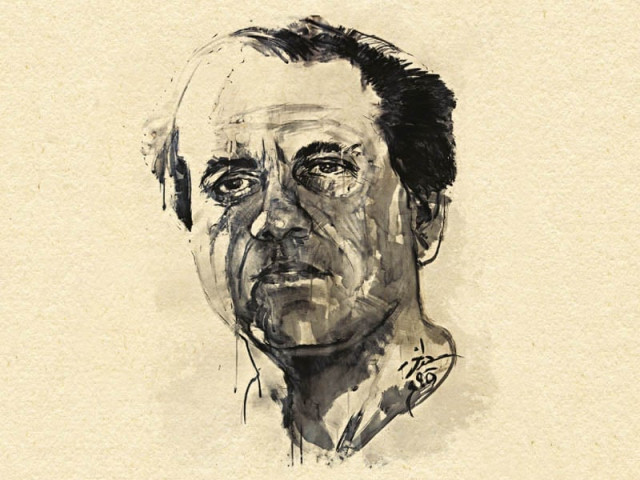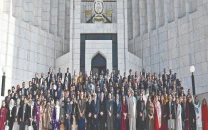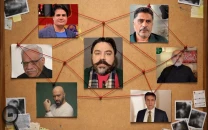The real essence of Salmaan Taseer
An anecdotal account of the man that he was.

A little over 30 years ago I met Salmaan Taseer in Dubai. I was straight out of law school and working for a US-Pakistani firm in Dubai. There were few people a 22-year-old could find much commonality with. Salmaan was different that way. He was interested in and interesting to many. We would meet up for dinner at least once a fortnight and chat about everything, politics, people, work, movies, travel, everything. He was the quintessential open book, difficult for some to read and understand but those who did never wanted this book to end.
At the surface he was a very successful man who built empires. He did but he also left them to others as he pursued his greatest passion – politics. When I met him he had written his book on Mr Bhutto and was pretty much persona non grata in General Zia’s Pakistan. How huge an admirer of Mr Bhutto’s I was yet to discover. One evening I had gone to dinner, Salmaan said that someone who had just arrived from London would be joining us. A short while later the bell rang and a young, very exhausted Tariq Islam entered. He was Mr Bhutto’s nephew and had been living in exile in various countries as Zia was not particularly welcoming. His UK visa had run out, he had no job and nowhere to go. Salmaan heard about his predicament and called him in London saying you don’t know me but come to Dubai I have a job for you. Tariq arrived a few days later. It would be many years before I discovered that Tariq and Salmaan met for the first time that day. In fact when Salmaan died so many similar tales surfaced. That to me was the real essence of the man - kind and compassionate to those truly in need. It was that compassion and kindness that took Salmaan to meet Mukhtaran Mai immediately after being sworn in as governor and assure her of his support. And it was that kindness and compassion that took him to Sheikhupura Jail to meet Aasia Bibi and explain to her that she needed to put her thumbprint on a petition for mercy. He took the petition to the president, who procrastinated, the religious right protested, and the petition was never signed.
The most hideous crimes are committed daily. Duly shocked, we condemn them and then file them away in some deep recess of the mind so we aren’t plagued by images and are able to sleep at night. But not everyone is so lucky. In fact most are not. Grief is personal and tragedy sits in every home. It is personal to all those touched by it and because there is so much tragedy, as a means of survival, we try to avoid being touched by another’s grief lest we are sucked over and over again into tragedy so we eventually become immune to it. We each need to grieve our own and respect another’s grief.
But ever so often the tragedy extends beyond the life that has been lost and centres on something bigger, something that endures long after we all are gone. Salmaan’s murder was a terrible tragedy for my sister, her children, our entire family. The grief and shock was compounded by the reaction of a small but violent and intimidating segment of our society who seek to even take your right to grieve. What’s worse is that this small and violent group is going unchallenged and as a result is using its voice and aggressive street presence to grow and occupying the space we seem to be prepared to cede so easily.
On January 4, 2011 at around 4:15 on a lovely winter afternoon as we entered a new year we thought was full of promise and hope, Salmaan Taseer the serving Governor of Punjab was murdered, by a man assigned to protect him, ironically for speaking out for the most disadvantaged section of society. The section of society his party sees as its constituents: poor, Christian and a woman. Gunned down in cold blood in full view of dozens of people. Everyone including the government ran for cover, giving that small group of people licence to take to the streets to condone the murder and to publicly promise the same for anyone who tried to speak out.
Years of teaching hate and intolerance paid off. Pakistan was quickly divided among those who could not hide their satisfaction at the murder of a man who had spoken out and the rapidly shrinking segment of those who believe that tolerance is the only way forward. But Salmaan died as he lived by his belief in natural justice and what is right. As he never tired of quoting Munir Niazi – kujsheher de lok vi zalim san kujsaanu maran da shok vi si (Yes, my fellow citizens were oppressive; but yes, I too had a death wish).
The writer is a lawyer and hosts “24 Seven” on Business Plus
Published in The Express Tribune, January 4th, 2012.



















COMMENTS
Comments are moderated and generally will be posted if they are on-topic and not abusive.
For more information, please see our Comments FAQ